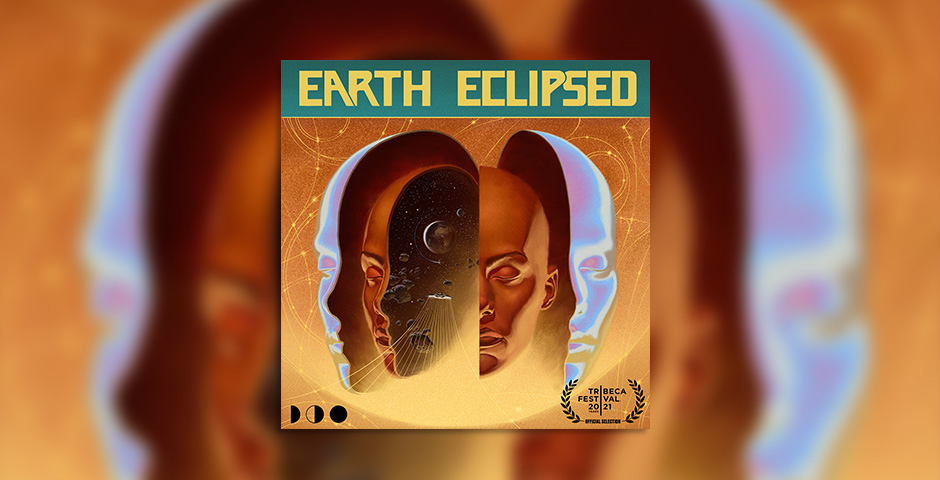Everyone loves a good sci-fi story. The suspension of belief necessary to enter the world creators have built, time and space travel, the invitation to imagine an infinite number of possibilities and timelines. The Lunar Company challenged themselves to translate complexity science fiction into an audio format. The result was taking digital storytelling and sci-fi to new heights in the critically-acclaimed podcast series Earth Eclipsed. This auditory adventure inherently allows listeners to create their own fantasy through an impressive musical score, well developed actors, sound effects and more. This easy listening experience caters well to creative minds and encourages imagination amongst others. It’s been well received by many, and took home three Gold Lovie Awards last year.
The series follows neuroscientist Alexine Prometh on her mission to save millions with her life’s work on the Abacus Project while attempting to outwit Nico Dunn, the antagonist of the story. The futuristic sci-fi series goes in depth to understand utopian society and shows the extensive lengths one will go to help others. Earth Eclipsed will satisfy your sci-fi fantasy cravings and will leave you wanting more.
Earth Eclipsed was produced remotely during the pandemic. What was it like behind the scenes in the creation of these episodes? How did working remotely impact the team and the quality of the project?
| The day we were set to record in person was the day the pandemic lockdown measurements were put into effect, so we had to adapt our strategy quickly. While the team had trouble at first adjusting to the new reality of remote production it was actually a boon in disguise. It took planning and technical prowess to figure out how to ensure consistent sound quality, but once we did, recording all of Earth Eclipsed remotely allowed us to work with actors around the world, which we wouldn’t have been able to do if we were doing a local recording. It was still important to us; however, to have the actors interact with each other, because we wanted them to be able to react to each others’ energy. That was definitely a challenge, because it meant coordinating global schedules across different timezones, not to mention we had to problem solve on the spot for unanticipated issues on Zoom. However, facing these issues created an environment where creative problem solving was encouraged. With every new problem, we found solutions that took the project two steps forward. While we were concerned about the isolated nature of working with the actors remotely, we found that by recording together, our cast and crew ended up closer than we could have ever imagined. The reality of voice work is that you often don’t record together even if everyone is local, and in some ways remote work enabled that togetherness. We think it brought a special energy that you can hear in the final product.
Adversity created an opportunity and through that opportunity we were able to improve our work and creative thinking. |
Your podcast has received high praise for its writing, and exploration themes like what it means to navigate a utopian society, morality and more. Why do you think the Earth Eclipsed story has resonated with so many listeners?
| Part of why we, as creators, were drawn to sci-fi is that it allows us to hold a mirror up to our world. We spent a lot of time talking about the philosophical underpinnings of the series and the themes we wanted to explore. What was important to us, though, and why we think it resonated with listeners was that we were able to ground those discussions in characters whose motivations an audience could empathize with, even if they didn’t necessarily agree with their choices. While a lot of themes we wanted to explore were either timely or big philosophical questions, none of that would have mattered if the characters didn’t have relatable goals, and if they didn’t make interesting choices in pursuit of those goals. Something we love about the series is that it’s possible to enjoy it without ever thinking about those themes, though, if that’s not what interests you. So if you’re the type of listener who only wants to immerse yourself in the characters’ adventure, that’s possible to do. Ultimately, we wanted people to enjoy the listening experience. We tried to make it fun, dramatic, and exciting, and that was always our primary concern, regardless of the themes. We’re grateful our approach of asking big questions but rooting them in interesting characters resonated with people. Of course we hoped it would, but when you put something out in the world, you have no way to know if you’ll be successful. |
The podcast’s music score immediately stands out, and is wonderful. How did you approach music and sound in Earth Eclipsed, was it all made in-house, and what was your process?
| When we conceptualized the music of Earth Eclipsed, we knew we wanted to connect the sleek futuristic setting of the Concord that Dr. Alexine Prometh inhabits with the more playful, messy world of space miner Nico Dunn. The music tries to bridge these worlds. Classical, orchestral instrumentation mixed with synths, beats, and electronics reflect the more serious, organized, machine-like sounds of the Concord, and that’s juxtaposed with the more traditional, slow, acoustic sounds of the outer worlds.
Earth Eclipsed is a space opera à la Star Wars, a sweeping and fun adventure tale, but one that tackles such serious themes as fascism, resistance, surveillance, and what it means to be free. The music reflects this duality as well. At times playful, other times dead serious, it connects these conflicting tones and helps the show deliver its punch. Scoring Earth Eclipsed was one of the final steps in completing the season. Once the dialogue had been edited and the sound design was in place, we divided up the scenes amongst three composers and wrote music for each (two of us were also the show’s sound designers). Most of the music was done using software instruments and synthesized sounds instead of live instruments. We did use some real performers for key moments however, such as the violin performances in episode 7 or the full choir singing the Concord Anthem in episode 8. The anthem was one of the most exciting pieces of music we wrote. It was recorded remotely with live singers in Macedonia, with the three of us tracking it from our respective homes in Los Angeles and London. |
Why was audio chosen as the medium rather than visual? What is it that audio offers as compared to other channels?
| What is unique to audio is that it allows the ability and freedom for the listener to imagine. That is both daunting and liberating. It’s daunting because you give up a lot of control to the listener since they can imagine something completely different from what you’ve envisioned. But it’s liberating because it gives us the freedom as creators to engage with the audience’s imagination. While it’s our job as storytellers and audio fiction creators to give the audience a fully-realized world, we wanted to give the audience the freedom to imagine. For us, this opened up new avenues for creativity. We used the lack of visual information to create tension: for example, there were moments where the audience could hear that something intense was happening, but, by not being able to see it, they didn’t know whether the outcome was positive or negative. We would use sounds and timing to heighten anticipation before finally revealing the outcome. You couldn’t do that in a visual medium. Everything from the dialogue, to the music, to the texture of specific sound effects, is a tool for the audience to put together what this world looks like in their minds. The result is something unique and special that can transport audiences to a galaxy far away without leaving their living room. |
The cover art for the podcast is very intriguing and seems to tell a story of its own. Can you tell us a little bit about the artwork and how it relates to the story told in Earth Eclipsed? Why was that image chosen?
| Nick Abcarian, the concept artist we worked with, was instrumental in creating the artwork that captured the essence of the show so well. From the get go, we wanted to create something that alluded to the great classic sci fi books of the 1970’s. Earth Eclipsed takes a lot of sci fi inspiration from Ian Banks, Isaac Asimov, Dan Simmons and other great classic sci fi writers and so we wanted that inspiration to be reflected in the cover art. After referencing many different sci fi books, we landed on a design that brought both a sense of nostalgia for the classic while providing something modern and fresh.
The many faces and layers of our main character are represented by the opening faces in the art. The first face is Dr. Prometh’s outer persona that is a reflection of her perfect society, but as we dive deeper we find a more human side hidden underneath the veneer of chrome. At the very center is the thing that connects all humans, Earth, which represents the heart, the messiness and good that defines us as human beings. The journey to discover our human nature is very much the same journey that our characters go through in the show so we wanted to make that the focal point to the cover art while providing some hints as to where the series could be heading. |
What does your Lovie Award win mean to you?
| Our Lovie Award win means legitimacy. Earth Eclipsed was our first project and to see it get the reception it did at the Lovies is absolutely amazing. A lot of love and thought was put into every second of the show and to see it recognized is something we never could have imagined for the show. It encourages us to create more and propel us to be even bolder – bolder in our themes, bolder in our creative choices and bolder in our ambitions to create great audio storytelling. As an independent creator, the Lovie win shows us that the entertainment industry is ready for something new, exciting, and different. We can’t wait to share Earth Eclipsed season 2 and propel the audio fiction industry forward. We can’t thank the Lovies enough. |



